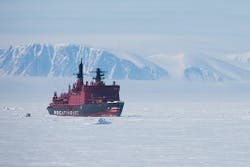Rosneft outlines Russian Arctic investigations
Offshore staff
MOSCOW – Rosneft says its Kara-Winter-2015 scientific-exploratory program has been completed offshore northern Russia.
This is the world’s widest-ranging arctic expedition of the past 20 years, the company claims, supported by the Arctic Research and Design Center and the FSBI Arctic and Antarctic research institute.
The 10-week exploration campaign involved theYamal atomic icebreaker travelling from the Barents Sea up to the East Siberian Sea, along virtually the entire Russian Arctic shore.
Works were performed in the Barents Sea, Kara Sea, East Siberian Sea, and Laptev Sea, in the Novaya Zemlya and Severnaya Zemlya archipelagoes, the Novosibirsk islands, and for the first time on Franz Joseph Land.
Fields covered comprised East-Prinovozemelskys-1, 2, 3 North-Karsky, Ust-Oleneksky, Ust-Lensky, Anisinsko-Novosibirsky, Albanovsky, and Perseevsky.
The expedition included meteorological, oceanographic, ice patrol, glaciological and biological observations. A team of specialists studied mechanical properties of ice, taking more than 2,000 measurements on 35 ice stations, and morphometric parameters of flat ice to calculate loads on designed engineering structures.
In addition, they installed more than 100 autonomous sensors on icebergs and ice fields to measure parameters of drift and to track their coordinates.
Studies of the seabed and keels of hummocks and icebergs were performed using remotely operated submersible vehicles and sonar.
Rosneft says it will use results from this and previous ice research expeditions to determine safe locations for future exploration drilling; design of drilling platforms and other facilities for oil production; and selecting possible routes of offshore pipelines.
Research in the Arctic continues with this year’s Kara-Summer-2015, Chukotka-Summer-2015 campaign, and regional engineering-geological studies in the Laptev Sea.
06/17/2015
